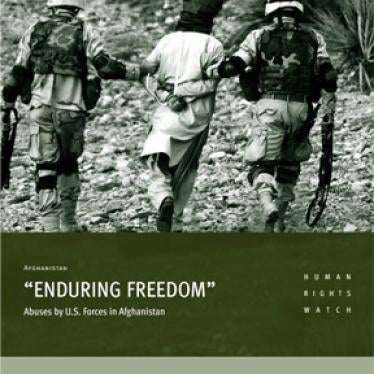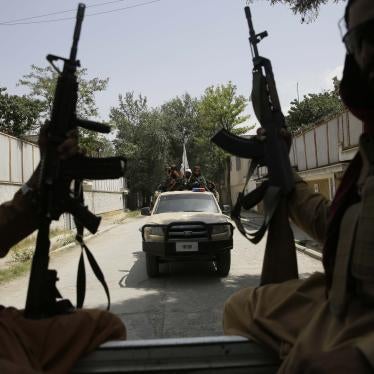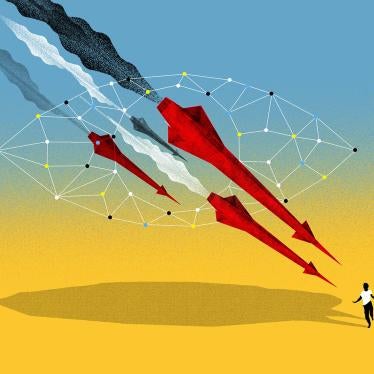(London) - Mistreatment of prisoners by U.S. military and intelligence personnel in Afghanistan is a systemic problem and not limited to a few isolated cases, Human Rights Watch said today.
Human Rights Watch called on the United States to immediately release the results of past investigations into misconduct by U.S. personnel in Afghanistan, including information about two Afghan detainees who were killed in U.S. custody in December 2002 and another detainee who died in June 2003.
"Afghans have been telling us for well over a year about mistreatment in U.S. custody," said John Sifton, Afghanistan researcher for Human Rights Watch. "We warned U.S. officials repeatedly about these problems in 2003 and 2004. It's time now for the United States to publicize the results of its investigations of abuse, fully prosecute those responsible, and provide access to independent monitors."
In a March report, "Enduring Freedom": Abuses by U.S. Forces in Afghanistan, Human Rights Watch documented numerous cases of mistreatment of detainees at various detention sites in Afghanistan, including extreme sleep deprivation, exposure to freezing temperatures, and severe beatings. Detainees complained about being stripped of their clothing and photographed while naked. Some of these abusive practices during interrogation were similar to those recently reported in Iraq. Recent media reports have also documented new cases of mistreatment in Afghanistan.
The Afghan Independent Human Rights Commission (AIHRC)—an autonomous institution within the Afghan government—has also received numerous complaints about abuses by U.S. troops in 2003 and 2004 at its local offices in south and eastern Afghanistan, where U.S. military operations occur regularly. The commission repeatedly raised concerns about abuses with U.S. officials in 2003 and 2004, as did local government representatives and officials with the United Nations Assistance Mission in Afghanistan.
On May 10, the AIHRC formally requested access to U.S. detention sites in Afghanistan. Human Rights Watch has also made several formal requests to visit U.S. detention sites in Afghanistan through 2003 and 2004, none of which received any response. Human Rights Watch made a request to U.S. Secretary of Defense Donald Rumsfeld on May 6, 2004 asking for access to all detention sites maintained by the United States in Iraq, Afghanistan, and other undisclosed locations.
"The United States has shown that it can't police its own prisons," Sifton said. "Human rights monitoring groups should be given access to all detention facilities in Afghanistan as well as in Iraq."
Human Rights Watch said that the United States has still not provided any adequate explanation for the three detainee deaths that took place in Afghanistan in 2002 and 2003. The first two deaths, which took place in December 2002, were specifically ruled homicides by U.S. military pathologists. (For more on all three cases, please click here)
Military officials in the Army Criminal Investigative Division told Human Rights Watch in late 2003 and early 2004 that investigations into the two homicides were "ongoing." But in April, Human Rights Watch received credible information that preliminary results of a military investigation into the two deaths were in fact completed in early 2003, and that some disciplinary actions were taken against U.S. personnel, although no prosecutions were initiated. U.S. military officials have repeatedly refused to explain to Human Rights Watch the circumstances of the third detainee death, which took place in Asadabad, in eastern Afghanistan, in June 2003.
In March of this year, Human Rights Watch again called on the United States to release the results of its investigations into the three deaths. These requests were ignored.
"We've basically been stonewalled," said Sifton. "It's been well over a year since the two detainees were killed in Afghanistan, and U.S. officials are still supposedly investigating. It's time for them to tell the public what happened."
Testimonies taken by Human Rights Watch in Afghanistan show that many detainees were beaten during the initial stages of detention. Detainees who were held in Kandahar airport in early 2002 reported being stripped naked, kicked and punched, and forced to endure freezing temperatures.
U.S. officials have told journalists and Human Rights Watch that U.S military and intelligence personnel in Afghanistan employ an interrogation system that includes the use of sleep deprivation, sensory deprivation, and forcing detainees to sit or stand in painful positions for extended periods of time.
"We know now that abuse of detainees was an established part of the interrogation process," said Sifton.
Testimony from Afghan detainees gathered by Human Rights Watch:
S.K. [name withheld], February 11, 2004, discussing how he was initially detained by U.S. forces and then transported by air from western Afghanistan to Kandahar airbase in early 2002:
[In western Afghanistan:] The Americans blindfolded us and, worst of all, they made us completely naked and made us to sit in a cold room and we were shivering and trembling because of the cold air. . . . [Describing transport to Kandahar:] I was naked and I had no clothes at all when I was moved . . . . [Upon arrival at airbase in western Afghanistan:] I was pulled out of the car and moved towards an airplane. At the airport, someone who was pretty strong held my neck under his arm and pressed it hard and meanwhile kept punching me hard on my face and one punch hit me hard on my mouth and two front teeth of my upper jaw fell out, which you can see now [interviewee is missing both teeth].
[In Kandahar:] They behaved very rude with me after the plane landed in Kandahar. It was cold and they threw us on the desert for more than an hour. Then some army men came and took us inside. Getting us inside the room there were some guards ready, and they were beating us mercilessly, without any reason. They were kicking and punching us. Mostly they were beating us on our backs. Later [they] gave me clothes to put on. They shaved our hair and our beards and mustaches. After that they took me for an interrogation and before asking any questions they started beating me. One person picked me up high over his head and threw me onto a desk and made me lie there. And then two or three other persons hit me with their knees on my back and shoulders. . . . The next day I was taken for interrogation. . . .
There was a man with us who was pretty old . . . and he was mistreated too. He complained to me that he was beaten during interrogations. His eyes were bruised, which indicated to me that he was beaten. In short, everyone was beaten in Kandahar. It was a bad place.
M.S.M., January 3, 2004, discussing detention and transport from northern Afghanistan to Kandahar in early 2002:
[On the plane to Kandahar:] We were shackled and our eyes were covered so that we could not see anything. . . . [A]ll the handcuffed prisoners were forced to sit with their legs stretched and hands behind them and the whole body bent onto the legs all the way. [Demonstrates by kneeling and sitting on top of his calves and feet, with torso bent down over the knees.]
It was very difficult to remain in that position and if we fell to the side or moved, the armed men standing over our heads would beat us mercilessly with their army boots, kicking us in our back and kidneys. We were all beaten, without exception. . . . Our eyes were closed [blindfolded] while we were getting out of the helicopter at the Kandahar airbase. One man pulled me up by my arm and threw me down the stairs, and then made me to lie down on the ground with my face upward. We did not have the right to move, and if we did we were beaten. Other people were beaten. . . When we were in Kandahar, we were not allowed to talk with each other and if we did, we were beaten and we were not allowed to sleep. For instance, if we were sleeping we were waken up or if we were covering our head with our bed cover we were beaten strongly.







